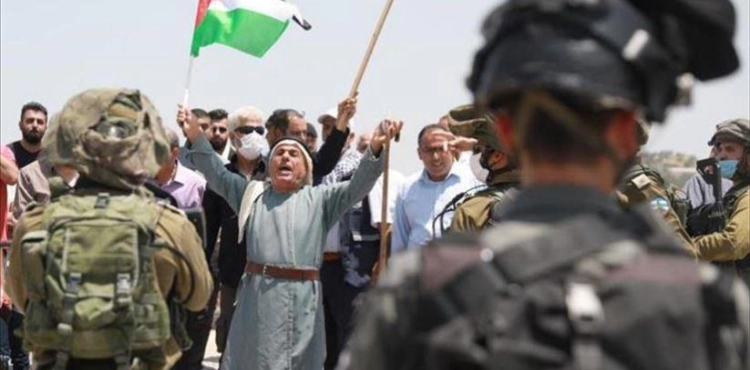The Palestinian Mohammed Abu Dergham is facing an unknown fate, with a date set by Israel to annex the Jordan Valley region in the West Bank, which could make him homeless from his place of residence and work.
Abu Dergham, who works in agriculture like most of the Jordan Valley population, says he is watching with great concern Israel’s plan to annex large parts of the West Bank, particularly the Plain (Al-Buqei´a), where it has been working for decades.
Abu Dergham (60 years) is living on rainfed and irrigated agriculture by planting hundreds of acres he inherited from his grandfather decades ago, while providing daily job opportunities for about 30 Palestinian workers.
The man says that the Israeli annexation scheme is "total destruction for us," noting in particular the possibility of being displaced from their homes and lands "without right and unjustly."
Israeli Prime Minister Benjamin Netanyahu has repeatedly announced his intention to impose Israeli sovereignty on parts of the West Bank occupied since 1967, including the Jordan Valley region on July 1.
The Palestinians objected to the annexation plan, as well as the international community and the United Nations, as a "violation" of international law and undermine the vision of a two-state solution to conflict.
"We do not know what the rate of annexation will be and how will it be like after implementing the plan? Especially as we fear the loss of our lands that we inherited from our ancestors and lived in for decades," he said.
He added, "We look at the annexation as displacement for us from our land, because what is meant by this process is the land of fathers and grandparents, so I cannot accept that anyone come and put a fence or a wall to separate me from it or specify for me the time I enter it through certain permits."
Abu Dergham continues, while referring with his hand to about 600 dunums planted with the fruits of potatoes, tomatoes and melons, "We are concerned about our fate and the loss of our lands that constitute all of our lives."
Abu Dergham supports a family of 12 individuals, all working in agriculture, in addition to dozens of workers who work throughout the year in this field through his farms, and they may now live without a source of livelihood due to the loss of this land.
The importance of the Great Valley lies in the fact that it is a warm and fertile natural region that can be used for agriculture throughout the year, as it sits above the most important water basin in Palestine.
The Jordan Valley forms a quarter of the area of ​​the West Bank, and about 50 thousand Palestinians live, including the city of Jericho, or 2% of the population of the West Bank, and is described as the food basket for the Palestinians.
The Jordan Valley constitutes 50 percent of the total agricultural area in the West Bank, and it produces 60 percent of the total vegetables.
Israel controls 87 percent of the Jordan Valley border lands, and it views it as a security reserve, and says it wants to keep the area within any solution with the Palestinians, who absolutely refuse to do so.
The Palestinian Burhan Al-Asmar, 47, considers that the Israeli annexation plan, once implemented, "will constitute a new catastrophe for the Palestinians," noting that "targeting our land for the purpose of displacing us and displacing the settlers at the expense of the Palestinian presence."
Al-Asmar told Xinhua that the annexation scheme is "a great catastrophe in the full sense of the word. If they take us out of these pastures where we go, we will surely lose our livelihood."
Al-Asmar fears losing the rangelands, which are lands for him and his family in Khirbet Makhoul in the Jordan Valley where he used to graze his sheep.
He complains that, over the years, Israel has intentionally facilitated settler control over large areas of land belonging to Palestinian citizens in these areas, which will double if the annexation and elimination of the Palestinian presence in these lands is eliminated.
The Palestinian economist, Samir Halila, warns against the danger of ambiguity regarding the annexation map that Israel intends to implement, indicating that this is deliberate to cover up its plan.
Halila says that the annexation plan will eliminate job opportunities for thousands of Palestinian farmers in the Jordan Valley and limit the economic benefits to the area for the benefit of the settlers.
He adds that the definition of the products of settlements established in the Jordan Valley as an Israeli product will mean greater ability to compete abroad in the global markets, as well as granting tax facilities and lower production costs, which means the ability of settlers to sell at prices with enormous advantages compared to the Palestinians.
Israel controls 400,000 dunums on the pretext of using closed military areas, or 55.5% of the total area of ​​the Jordan Valley.












